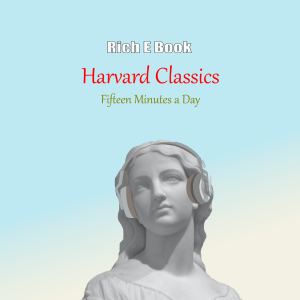
269K
Downloads
736
Episodes
Former President of Harvard University Charles W. Eliot wrote in his introduction to the Harvard Classics, "In my opinion, a five-foot shelf would hold books enough to give a liberal education to any one who would read them with devotion, even if he could spare but fifteen minutes a day for reading." Here you are, you can easily listen to his entire 15-minutes-a-day study guide while commuting to and from work (most of us spend far more than 15 minutes a day commuting each day), doing mundane work in the office, washing dishes at home, or doing most of the things day in and day out. It is so easy, so entertaining, and so educational that they can be listened to again and again, until they permeate into our own thinking and into our characters. Perhaps, in one year's time, you will become someone you barely recognize, all for the better. Who knows? -- Rich E Book
Episodes

Monday May 30, 2022
Introductory Note: Henry Wadsworth Longfellow
Monday May 30, 2022
Monday May 30, 2022
Introductory note on Henry Wadsworth Longfellow (Wikipedia)

Monday May 30, 2022
The Building of the Ship, Henry Wadsworth Longfellow
Monday May 30, 2022
Monday May 30, 2022
At the close of the war, a torn and bleeding nation set about to rebuild its shattered frame. The result was a stronger nation rising from an almost disrupted union. (Volume 42, Harvard Classics)
Memorial Day.

Sunday May 29, 2022
Introductory Note: The Thousand and One Nights
Sunday May 29, 2022
Sunday May 29, 2022
Introductory note on The Thousand and One Nights (Volume 16, Harvard Classics)

Sunday May 29, 2022
The Thousand and One Nights (The Barber’s Fifth Brother)
Sunday May 29, 2022
Sunday May 29, 2022
A Bagdad merchant dreamed of the money he would make from the sale of a tray of glassware, and of marrying the king's daughter. But, daydreaming, he kicked over the tray. (Volume 16, Harvard Classics)

Saturday May 28, 2022
Introductory Note: Thomas Moore
Saturday May 28, 2022
Saturday May 28, 2022
Introductory note on Thomas Moore (Wikipedia)

Saturday May 28, 2022
Poems, by Thomas Moore
Saturday May 28, 2022
Saturday May 28, 2022
Any one of these poems, "The Harp That Once Through Tara's Halls," "The Last Rose of Summer," "The Light of Other Days," would alone have made Moore immortal. (Volume 41, Harvard Classics)
Thomas Moore born May 28, 1779.

Friday May 27, 2022
Introductory Note: Gotthold Ephraim Lessing
Friday May 27, 2022
Friday May 27, 2022
Introductory note on Gotthold Ephraim Lessing (Volume 32, Harvard Classics)

Friday May 27, 2022
The Education of The Human Race, by Gotthold Ephraim Lessing
Friday May 27, 2022
Friday May 27, 2022
To advance freedom of thought, Lessing published an essay of one hundred paragraphs outlining the history of religion. The wrath of orthodox churchmen was hurled at his head, and Lessing was left alone to defend his daring theories. (Volume 32, Harvard Classics)

Thursday May 26, 2022
Introductory Note: King Lear by William Shakespeare
Thursday May 26, 2022
Thursday May 26, 2022
Introductory note on King Lear by William Shakespeare (Volume 46, Harvard Classics)

Thursday May 26, 2022
The Tragedy of King Lear (Act I, Scene I), by William Shakespeare
Thursday May 26, 2022
Thursday May 26, 2022
Goneril and Regan falsely swore they loved their father, King Lear, more than life itself. Cordelia could find no words to express her sincere devotion. Then King Lear made the decision that started a series of exciting events. (Volume 46, Harvard Classics)
Shakespeare's first daughter, Susanna, baptized May 26, 1583.
